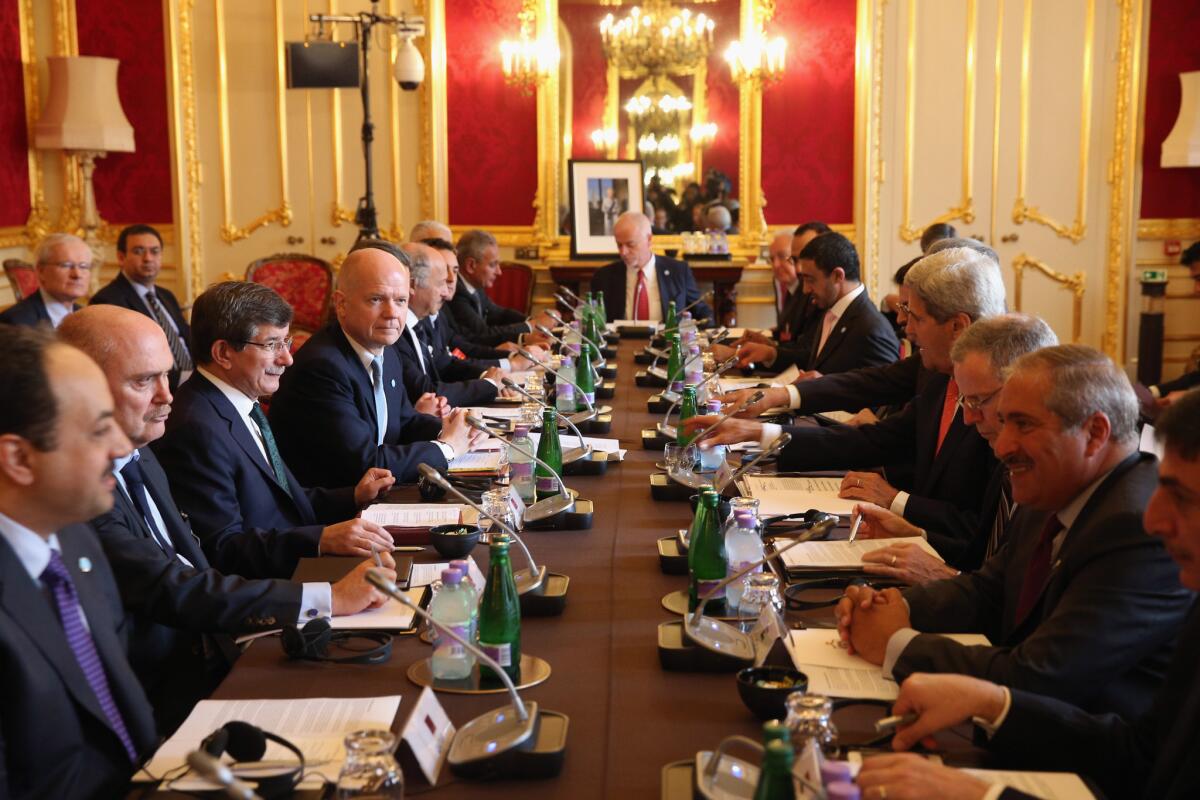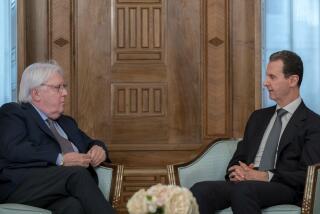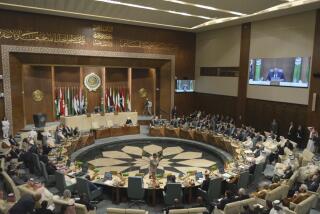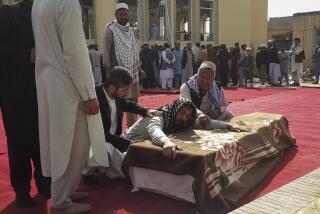Arab states and Western nations push Syria peace talks

LONDON â A key group of Arab states and Western nations, including the United States, urged the âmoderate oppositionâ in Syria to attend peace talks aimed at ending the countryâs civil war, but underlined their insistence that Syrian President Bashar Assad could have no role in any new government formed as a result.
âIt is imperative that we try to get to the negotiating table and try to save the lives and save the existence of the state of Syria itself. The only alternative to a negotiated settlement is continued, if not increased, killing,â U.S. Secretary of State John F. Kerry said.
But âone thing is guaranteed,â he added: Neither the U.S. nor what he called the moderate opposition forces arrayed against Assad would countenance any involvement by him in post-conflict Syria.
That resolve has proved a stumbling block so far in convening a peace conference this fall to try to end the fighting that has claimed more than 100,000 lives and to map a transition to democratic government. Some opposition figures have vowed to boycott any negotiations that include supporters of the Assad regime.
Following a lunch meeting Tuesday in London, Kerry and diplomats from several European and Arab nations seemed to offer a way around that, saying it was possible to hold talks with Assad supporters while sticking to the position that the Syrian strongman himself would not take part in any power-sharing transition.
âYou canât reach mutual consent if youâre not talking to anybody. Thereâs no mutuality; thereâs no potential of consent,â Kerry said. âSo the fact is that you have to go engage in a discussion and then see. What the opposition has said is, their condition is that the intent of this is to see that Assad goes.â
Assad himself exhibits no intention of exiting the scene. In several interviews over the past few weeks, he has said he sees no reason why he would not run for re-election in Syria next year.
In an interview Monday, Assad questioned the legitimacy of the opposition and the rationale for holding a peace conference now.
âWho are the groups that will participate? What is their relation with the Syrian people? Do they represent the Syrian people or do they represent the country that made them?â Assad said during an interview with Lebanonâs Al-Mayadeen TV. âThere are many questions about the conference.â
Many analysts say Assad is in a stronger position now than just a few months ago, having bolstered his image somewhat by agreeing to the inspection, removal and destruction of Syriaâs chemical arsenal.
Kerry acknowledged progress on that front but insisted that âremoving the chemical weapons does not remove the crisis.â
He also warned that ultimate victory for anti-Assad forces could come only at the bargaining table, through a political settlement; continued fighting would precipitate the implosion of Syria as a nation-state, destabilize the entire Middle East, worsen the refugee situation and create an even more fertile breeding ground for radical Islamists.
Fear that jihadists, including some affiliated with Al Qaeda, are beginning to dominate the rebel movement has made Western officials increasingly concerned about finding and promoting acceptable anti-Assad partners. Among those is the Syrian National Coalition, which diplomats are trying to cajole to attend a peace conference.
âThe Syrian opposition, including the moderate armed groups and moderate opposition represented by the coalition, continue to need our strong collective backing,â British Foreign Secretary William Hague said.
Earlier, Hague told BBC radio: âThe reason we have to make sure that we are supporting and dealing with the moderate oppositionâŚwho are committed to a democratic, pluralistic, non-sectarian future for Syria is precisely because if they donât have a role, if they arenât part of a peace process in Syria, then all the Syrian people have got left is to choose between Assad on the one hand and extremist and foreign fighters on the other.â
The lunch meeting Tuesday brought together Syrian opposition figures with diplomats from the U.S., Britain, France, Germany, Italy, Turkey, Egypt, Saudi Arabia, Jordan, Qatar and the United Arab Emirates, all of which want to see Assad removed from power.
ALSO:
Russian investigators delve into bus bombing in Volgograd
Reports: U.S. drone strikes in Yemen, Pakistan killed civilians
Israeli forces kill suspected Palestinian militant in West Bank raid
More to Read
Sign up for Essential California
The most important California stories and recommendations in your inbox every morning.
You may occasionally receive promotional content from the Los Angeles Times.











